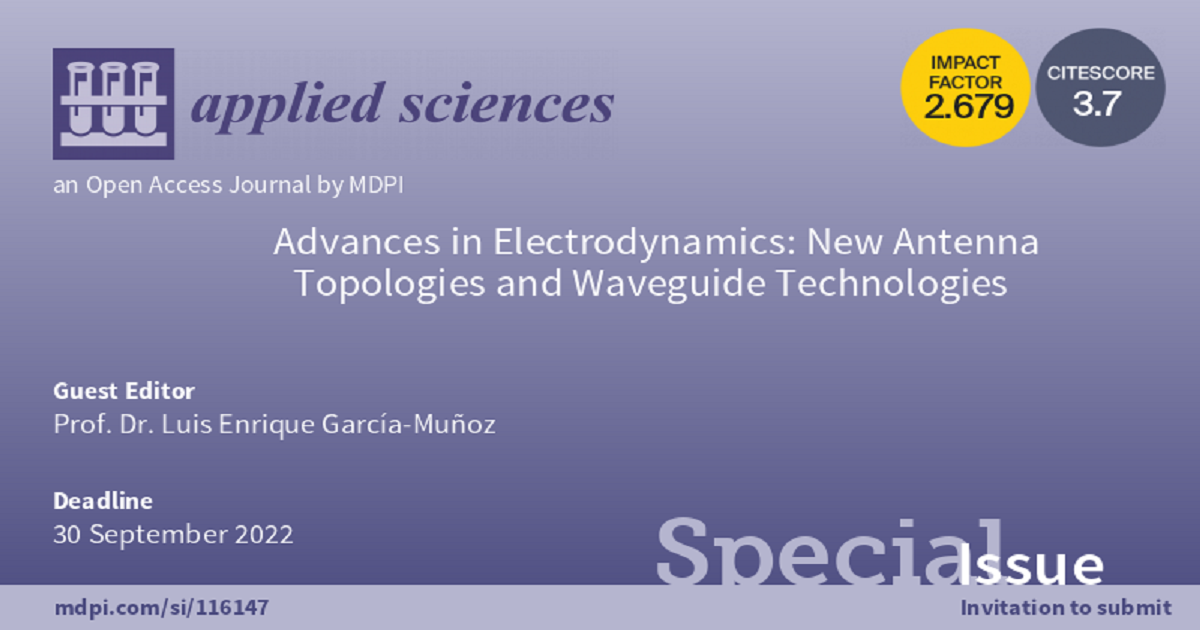- 2.5Impact Factor
- 5.5CiteScore
- 20 daysTime to First Decision
Advances in Electrodynamics: New Antenna Topologies and Waveguide Technologies
Special Issue Information
Dear Colleagues,
This Special Issue is intended to focus research toward disruptive technologies in the area of microwave antennas and devices. In recent decades, a special effort has been made in high-frequency technologies, which has facilitated access to the manufacture of structures that years ago were only thinkable in theoretical terms or could only be built in low-frequency ranges. In this issue, we intend to focus on research carried out on new advances in applied electrodynamics, without restrictions of frequency range or applications per se. The main objective is to present new elements for the analysis and synthesis of antennas and radiating and guided mechanisms, as well as their laboratory tests and measurements. Advances in radar, miniaturization of antennas, new numerical methods for analyzing structures, new technologies for manufacturing, such as 3D printing, new limits in receivers’ sensitivity, new records in emitted power, links at high frequency, new topologies for beam scanning, and low profile antennas for satellite applications are some of the areas covered by this issue. The relationship with areas such as quantum electrodymanics or light-gravity interaction are also within the scope of this issue, together with all the applications reported.
Prof. Dr. Luis Enrique García-Muñoz
Guest Editor
Manuscript Submission Information
Manuscripts should be submitted online at www.mdpi.com by registering and logging in to this website. Once you are registered, click here to go to the submission form. Manuscripts can be submitted until the deadline. All submissions that pass pre-check are peer-reviewed. Accepted papers will be published continuously in the journal (as soon as accepted) and will be listed together on the special issue website. Research articles, review articles as well as short communications are invited. For planned papers, a title and short abstract (about 100 words) can be sent to the Editorial Office for announcement on this website.
Submitted manuscripts should not have been published previously, nor be under consideration for publication elsewhere (except conference proceedings papers). All manuscripts are thoroughly refereed through a single-blind peer-review process. A guide for authors and other relevant information for submission of manuscripts is available on the Instructions for Authors page. Applied Sciences is an international peer-reviewed open access semimonthly journal published by MDPI.
Please visit the Instructions for Authors page before submitting a manuscript. The Article Processing Charge (APC) for publication in this open access journal is 2400 CHF (Swiss Francs). Submitted papers should be well formatted and use good English. Authors may use MDPI's English editing service prior to publication or during author revisions.
Keywords
- antennas
- microwave
- receivers
- radar
- numerical methods
- electrodynamics
- guiding system
- waves
- quantum technologies
- general relativity

Benefits of Publishing in a Special Issue
- Ease of navigation: Grouping papers by topic helps scholars navigate broad scope journals more efficiently.
- Greater discoverability: Special Issues support the reach and impact of scientific research. Articles in Special Issues are more discoverable and cited more frequently.
- Expansion of research network: Special Issues facilitate connections among authors, fostering scientific collaborations.
- External promotion: Articles in Special Issues are often promoted through the journal's social media, increasing their visibility.
- e-Book format: Special Issues with more than 10 articles can be published as dedicated e-books, ensuring wide and rapid dissemination.

